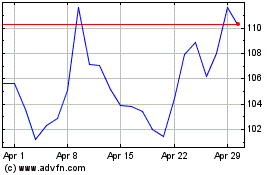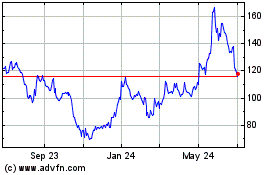By Gabriele Steinhauser
JOHANNESBURG -- Three new laboratory studies are raising
concerns that the immune response triggered by a Covid-19 infection
or vaccination may be less effective at protecting against the new
strain of the coronavirus that first emerged in South Africa.
The findings come from experiments done in the laboratory and
only look at certain elements of a body's immune response. Still,
they reinforce the possibility that vaccine makers and regulators
will need to update Covid-19 vaccines as the virus evolves.
A fourth study, conducted by scientists at BioNTech SE and
Pfizer Inc. and published by the companies, showed that their
vaccine successfully neutralized a variant that was initially
detected in the U.K. That study didn't include the South African
strain.
The U.K. variant has already spread to many other countries,
including the U.S.
More than a year into the pandemic, the discovery of new
variants that appear to have made the virus more contagious is
forcing researchers to adapt their understanding of the coronavirus
that causes Covid-19. One concern, researchers said, is that the
new strains are emerging in countries where a significant
percentage of people have already built up an immune response to
earlier variants after getting Covid-19.
If confirmed by additional research, the studies' findings would
suggest that winning the global fight against the coronavirus
pandemic could require repeated inoculations and updates to
existing vaccines, similar to what is done for flu shots every
year.
"We are learning how our body is forcing the virus to change,"
said Jinal Bhiman, the principal medical scientist at the National
Institute for Communicable Diseases in Johannesburg and a co-author
of one of the studies on the South African variant.
Studies on lab-grown viruses and blood drawn from people who
have either recovered from a previous bout of Covid-19 or received
a Covid-19 vaccine are some of the first experiments scientists
conduct when they want to find out more about a new variant.
Researchers who worked on the studies said that the tests only
examined the response of certain antibodies, while the human immune
system also includes so-called T-cells, blood cells that help
attack the virus, and other types of cells.
The studies haven't been published in peer-reviewed journals,
but were seen by outside researchers interviewed by The Wall Street
Journal.
More definitive data will come from human trials of Covid-19
vaccines under way in South Africa and in the U.K. and whose
results are expected within weeks. Those results will give a better
indication of how vaccines perform against the new strains.
The researchers who conducted the tests on the South African
variant stressed that current vaccine campaigns should continue and
the shots approved so far offer the best known protection against
Covid-19.
The South African variant has been found in 22 other countries,
including Canada, China and Germany, but not the U.S. Labs in the
U.K., Belgium, Botswana and Zambia have found it in people with no
travel history, indicating that it is already spreading in those
countries.
For two of the studies, researchers in South Africa tested how
the new variant, which has driven a powerful second wave of
infections in the country, responded to blood drawn from people who
had Covid-19 in the first wave, when other versions of the virus
were circulating. What they found was that the new variant was
either entirely resistant to antibodies generated from an earlier
infection or the antibodies were significantly less able to
neutralize the virus.
"A few of these plasmas are knocked out," said Alex Sigal, a
virologist at the Africa Health Research Institute, which conducted
tests on a live virus grown in its lab, and Germany's Max Planck
Institute for Infection Biology.
A second study replicated the South African variant's spike
protein, through which the virus attaches to and infects human
cells, on a different virus. New Covid-19 vaccines -- including
those developed by BioNTech and Pfizer and by Moderna Inc. -- also
target the coronavirus's spike protein.
That study found that blood from 21 of 44 people who had
previously had Covid-19 failed to neutralize the virus. Only three
blood samples -- from people who had suffered very severe cases of
Covid-19 -- were able to mount a powerful attack.
The findings may mean that variants such as the South African
one could infect people for a second time "and may foreshadow
reduced efficacy of current spike-based vaccines," the study
concluded.
James Naismith, a professor of structural biology at the
University of Oxford, said the South African papers' findings now
need to be confirmed by studies in the real world, such as clinical
vaccine trials or proof of large-scale reinfections by the new
strain. "We should be concerned, but not panic," he said. "There is
more to the immune response than just antibodies."
A third study -- conducted by researchers at Rockefeller
University in New York and the California Institute of Technology
in Pasadena -- ran a similar set of tests as the South African
scientists, but using blood drawn from people who had received
either the Pfizer or Moderna shots.
That study found that three prominent mutations in the South
African variant reduced the ability of vaccine-generated antibodies
to neutralize the virus by a small but significant margin.
One possible reason for the difference in results from the three
studies is that the U.S. scientists only looked at mutations in one
part of the spike protein, known as the receptor-binding domain,
that latches onto human cells. In the two studies done in South
Africa, some of the biggest impact on antibody response came from
another part of the spike protein, known as the N-Terminal, which
is also a target for neutralizing antibodies and whose significance
scientists are only starting to understand.
Another possible reason for the differences is that the vaccines
induce a stronger immune response than a previous Covid-19
infection.
The U.S. study concluded that mRNA vaccines such as the Pfizer
and Moderna shots "may need to be updated periodically to avoid
potential loss of clinical efficacy."
In human trials, the Pfizer and Moderna shots have proven to be
around 95% effective at protecting participants from developing
Covid-19 symptoms. So a moderate reduction in efficacy wouldn't
render them useless.
Moderna declined to comment on the U.S. study's findings, but
has said that it is studying the potential efficacy of its Covid-19
vaccine with multiple variants. A Pfizer spokeswoman said the
company was researching the E484K variant -- a reference to one of
the mutations in the South African and Brazilian variants -- and
would share its findings once they are available. BioNTech didn't
respond to requests for comment.
Pfizer's and Moderna's own study -- which looked at how
effectively blood from people who had received their vaccine
neutralized a virus manipulated to mirror the U.K. variant --
concluded that there was no reason to adapt the shots for the
British strain. Still, it said, "potential Covid-19 vaccine strain
change is prudent," adding that shots based on messenger RNA
technology could be adapted quite easily and quickly.
BioNTech's chief executive, Ugur Sahin, said last month that it
would take around six weeks to design another vaccine if a mutation
renders the current one ineffective. Dr. Sahin said, however, that
it was unclear whether regulators would allow such a modified
vaccine on the market or whether they would require a new trial,
which could take months.
Write to Gabriele Steinhauser at
gabriele.steinhauser@wsj.com
(END) Dow Jones Newswires
January 22, 2021 05:44 ET (10:44 GMT)
Copyright (c) 2021 Dow Jones & Company, Inc.
Moderna (NASDAQ:MRNA)
Historical Stock Chart
From Mar 2024 to Apr 2024

Moderna (NASDAQ:MRNA)
Historical Stock Chart
From Apr 2023 to Apr 2024
